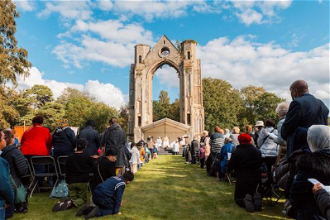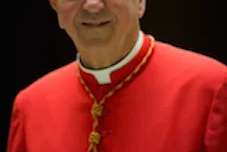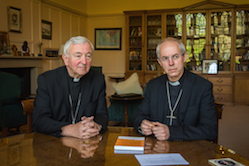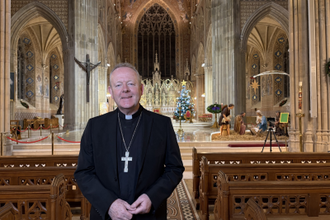Archbishop Nichols lecture at Brixton Prison
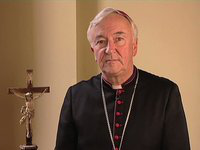
Archbishop Vincent Nichols
Archbishop Vincent Nichols today delivered a lecture on why criminal justice matters to the Church, and how Christian communities can respond in a practical way to the questions of crime, justice and rehabilitation. The Archbishop was speaking from the chapel of Brixton prison, at an event organised in memory of Sir Harold Hood, prominent Catholic journalist and former Vice President of the charity, who died in 2005.
The lecture drew upon the central messages on imprisonment and rehabilitation outlined in the Catholic Bishops Conference publication: "A Place of Redemption", which was launched in the same chapel in 2004.
Speaking to an invited audience of voluntary and statutory sector representatives from the Criminal Justice Sector, Archbishop Nichols, spoke about the deep commitment of the Church to helping those who find themselves in prison, irrespective of the offence they may have committed:
"I would like to offer a Christian perspective not as an 'answer' but as a contribution to the process of how society balances punishment, protection of the public and rehabilitation. As the Holy Father said in Westminster Hall, political choices need an ethical foundation.
"For the Church the focus must be on the person. We cannot define someone and reduce
them simply to one aspect of their lives - a crime committed. It is the whole person that matters."
Archbishop Nichols also praised the work of pact, and in particular the Basic Caring Communities (BaCC) which mobilises groups of volunteers, motivated by their faith, to provide support to ex-prisoners: "I am delighted that pact has responded to the challenge by launching BaCC. This is just one example of how Catholic Social Teaching with its focus on the Common Good produces practical direct action, motivated by the faith that drives us in all we do."
Andy-Keen-Downs, Director of pact, warmly welcomed the Archbishop's renewed commitment on behalf of the Catholic Church in England and Wales to the charity's work with ex-prisoners and with prisoners, children and families. He said: "In his first address as President of pact the Archbishop has given both the Catholic community and wider society a challenge to re-examine our attitudes and actions towards prisoners and their families."
Archbishop Nichols closed his speech by reminding the congregation of the commitment that the Catholic Church will be alongside prisoners.
"Inside and outside the walls. As Basic Caring Communities or as individuals. Not as a form of social service, but as an explicitly religious undertaking, motivated and sustained by the love of Christ. That is our duty. That is our privilege. As it was Sir Harold Hood's."
TEXT: SIR HAROLD HOOD MEMORIAL LECTURE
Archbishop Vincent Nichols at Brixton Prison - 7th October 2010
A CHRISTIAN APPROACH TO CRIMINAL JUSTICE
Introduction
In the pub, at the bus queue, in the canteen, everyone knows what should be done about criminal justice. The tabloids put it in headlines three inches high. Whether you want to lock 'em up and throw away the key, or to be tough on the causes of crime, it is an easy thing to talk about.
2 But it is a much harder thing to get right. How does society balance punishment, protection of the public and rehabilitation? What risks are acceptable? What penalties are justifiable? Every country and every democratic Government struggles with these dilemmas.
3 This afternoon, I would like to offer a Christian perspective not as an 'answer' but as a contribution to that process. As the Holy Father said in Westminster Hall, political choices need an ethical foundation. The role of religion in public debate is not to propose political solutions, but rather to 'shed light upon the application of reason to the discovery of objective moral principles'. In other words, to help identify the ethical basis on which sound political judgements can be based.
4 In twenty minutes or so, I cannot cover the whole of the criminal justice system. There is much I would like to say about community sentences, about imaginative penalties that keep an offender's links with employment, about restorative justice, but I hope you will forgive me if I concentrate on imprisonment and rehabilitation.
Pressures on the system
5 No one here will doubt that the Justice system in this country faces huge pressures. When Kenneth Clarke was last in charge of prisons, as Home Secretary in 1993, there were 44,500 prisoners in England and Wales. Today, he is in charge of prisons again, and there are over 85,000. Is that a sign of success or of failure in a criminal justice system? Are we better off as a country for having the highest rate of imprisonment of an major European country?
6 Churchill said that 'The mood and temper of the public in regard to the treatment of crime and criminals is one of the most unfailing tests of the civilisation of any country'. I think the test for any criminal justice system must be whether it is ultimately destructive or redemptive. And that, of course, is a judgement on our society, and on us: are we ultimately destructive or redemptive?
7 Let me say first, though, that for all the pressures on the prison system - the growth in numbers, the pressure on budgets, the populist cry for punishment - there have been some remarkably positive developments. The 'Decency' agenda was, in my view, a landmark in how we regard ourselves as a society. We punish people by depriving them of their liberty, not by depriving them of their human dignity. And if you talk to Chaplains, they will say that most Prison Officers show a level of patience, common sense, support, and professionalism, that would have been unimaginable to previous generations. (And let me here thank all prison staff for their commitment in what are often very difficult circumstances.) I am also very heartened to hear Kenneth Clarke, as a new Justice Secretary, putting such emphasis on rehabilitation.
Why this matters to the Church
8 The state of our criminal justice system matters to the Church, and it has a major part to play in responding to the needs of those affected. The Prime Minister recognized this in his farewell address to the Holy Father. He said that the Church is crucial to the new culture of social responsibility precisely because of the faith that shapes the beliefs and behaviour of Christians: 'it is their faith that inspires them to help others'.
9 And Sir Harold Hood provided a prime example of that. Meticulous as a journalist; self-effacing in saving a boy from drowning; a Vice-President of the Bourne Trust and PACT; committed to rehabilitation and to helping prisoners' families; but most importantly of all, a man with 'a deep devotion to the Mass' (Daily Telegraph obituary 7 Sept 2005). He would simply turn up at Wormwood Scrubs for the privilege of sharing Mass with the prisoners. The Mass, I am sure, was the well-spring of his life and his work for prisoners. I am delighted that some of his family are with us today and that I can join them in honouring his memory and example.
10 As Christians, we know that care for the prisoner is a specific injunction of the Gospel, and that when Christ comes in his glory, he will say to some: 'When I was in prison, you visited me'.
11 As Christians, we know that we have the same human dignity in common with every prisoner.
12 And as Christians we know that we share the same human frailty that makes us fall, and makes us sin. And then makes us sin again. The confessional knows as much about re-offending as any court does.
13 That is why the boundaries of a Diocese cannot recognize prison walls as any sort of barrier.
The practical response of the Church
a) In prison
14 So what can the Church offer? And how far have we responded to the call made in A Place of Redemption, launched here in Brixton in 2004?
15 It is worth reminding ourselves of the challenge posed in its last paragraph:
'It is up to us to ensure that the prison service offers the continuing opportunities for transformation when the moment comes that the prisoner is prepared to embark on the journey of change. That no matter how hopeless their situation may appear to be, we must never give up on anyone. And that every place can be a place of redemption.'
Let there be no doubt that this was, and is, at the heart of Catholic Social Teaching. As Archbishop Martino, President of the Pontifical Council for Justice and Peace said in 2003:
'No reform must ever lose sight of the priority ... that continues to be absolute respect for the dignity of condemned persons and their rehabilitation in society.' (Letter to President of the International Commission for Catholic Prisons Ministry, 12 Sept 2003)
And it is in this question of dignity that the Church can do something unique.
16 Everyone agrees that self-respect - the belief that you are not a hopeless loser, that you can make something of your life - is crucial to rehabilitation. The Church, through its teaching, through its pastoral care, and through the Sacraments in particular, has a unique means of helping prisoners change and develop. Helping them to understand that their sins are forgiven, that they can start again, and that they are worth something, simply because they are created in God's image and loved by their Creator. For many it is a message that they can scarcely credit, and it may take time before they can believe in it - as it does for many who are not in prison.
17 Let me give you an example. Young people from every diocese were outside Westminster Cathedral to greet the Pope. One of my diocesan group was on day release
from a Young Offender Institution. He was there with his chaplain. What he wrote about the day - and I am quoting with permission - tells something very powerful:
'While I was waiting everyone was so welcoming and asked me how I was finding the day. They asked me where I was from, and I told my group I was from prison, but they didn't change towards me because I was from prison. I was nervous at first because I thought people might distrust me and not like me because I was from prison, but it was not an issue for them. This all reminded me of how good it is to be a Roman Catholic. You are part of a big family and never alone.'
He was baptised two months previously. 'Something really good can come from something bad' as he put it.
18 At the heart of that difficult daily work are our Chaplains. Some 200 of them: Priests, religious, lay people; full-time, part-time, sessional; and the hundreds of volunteers who work alongside them. They are out there, on the wings, on the landings 'warming chilled lives with the loving warmth of Jesus Christ' as the Papal Nuncio put it Sermon to chaplains, 2006. Catholics elsewhere in the prison, in education, in drug programmes, among the prison officers and governors, also play a part, of course. And the pastoral care they all offer is available to anyone in the prison who seeks it, Catholic or not, just as in any other aspect of the Church's mission in society.
b) Outside the prison
19 But the work of the Church goes with prisoners through the gate. PACT has long helped in supporting prisoners' families. They have committed no crime but they bear the effects of the punishment too. And a stable family is a great help in reducing re-offending. But what about those who leave prison with no family to go back to? Those who return to the same chaotic circumstances which led to their offending in the first place?
20 I am delighted that PACT has responded to the challenge A Place of Redemption by launching Basic Caring Communities. Small groups of volunteers from churches close to a prison. Groups who, between them, provide daily contact with a released prisoner: help with the practical issues of finding a GP or claiming benefits, friendship, moral support. In short, all the things that those of us with a place in society take for granted from our friends, our neighbours and contacts. All the things of which a prisoner, walking through the gate with a discharge grant of around fifty pounds and his possessions in a bag, may have none. Basic Caring Communities provide, in effect, a foothold in the community for those who have none of their own.
21 Although only launched last May, Basic Caring Communities has five groups associated with Wandsworth Prison and now there are plans to spread the initiative in London, Lancashire, Greater Manchester and Bristol. I commend it most warmly.
22 This is just one example of how Catholic Social Teaching with its focus on the Common Good produces practical direct action, motivated by the faith that drives us in all we do. There are other examples, of course, such as the De Paul Trust which helps young offenders find accommodation and provides mentors to help them reintegrate, or work in restorative justice. But time does not allow for a comprehensive survey of where faith can lead in providing help for prisoners.
Where is our focus?
23 It is inescapable that much of the focus of any Criminal Justice system will be on the offence committed. Michael Howard put it robustly when he said simply 'Prison works'.
24 Well if we think prison works, at the same time we must admit that for its inmates a lot of other things didn't work first. Housing didn't work. A stable family didn't work. Education didn't work. Employment didn't work. Drug prevention didn't work. Moral values didn't work. We seem to let an awful lot of things go wrong, before we find something that does, allegedly, work.
25 For the Church, though, the focus cannot be on the offence, but on the offender ... No, not even the 'offender', for us the focus must be on the person. We cannot define someone and reduce them simply to one aspect of their lives - a crime committed. It is the whole person that matters. That must be the subject of our care and concern. It is what happened in their lives before. It is what will happen to the rest of their lives. And ultimately it is about their redemption and eternal salvation - the same question that each of us must face.
26 In dealing with the whole person, inside prison or outside, we have to respect who they are. For Catholics, that means that the help, advice, or guidance we offer can only be in the context of the Church's teachings and sacraments. There are some today who seem to see the future with some sort of 'generic chaplaincy', providing spiritual support irrespective of the church family of the person, as part of a package of care and rehabilitation to all. That is, of course, valuable, and no chaplain would or should turn away any who seeks help. But where I part company from such thinking is in the idea that a generic approach can ever be respectful or sufficient.
27 The Catholic prisoner is still part of the Catholic diocese - as that young man outside the Cathedral so clearly valued. And the Catholic chaplain brings a unique perspective: he is the instrument of sacramental graces that, quite simply, no one else can provide. Catholic prisoners are entitled to no less. And it is our duty as Bishops to make sure that they get it. However widely our pastoral care may be available - and none of us would turn away anyone in need - the principal ministry of any prison chaplain must be to those whose faith he is sent to support. That is the Chaplain's mandate from the Church.
28 I should say that this is not just a Catholic point. The same principles apply, with equal force, to any other religion. I would expect to see their integrity similarly respected and supported. Prisoners do not have much; their religious identity is important to them. It is a fundamental right which should be respected.
29 I do not want to give the impression, though, that caring for the whole person is the sole prerogative of religion. I know how much time and effort goes into the work of probation officers, of pre-sentencing reports, and of the extent to which courts will go before finally sentencing someone to imprisonment rather than a community penalty. And the contribution of good officers on the wings is often exemplary. My fear, though, is that, with the best will in the world, some of this might get squeezed out as budgets get tighter.
Church or State?
30 This is not, however, a competition between Church and State as to who can do most. We need to recognise the scope for a new understanding of how much can be achieved by harnessing all our resources to the same end.
31 The Prime Minister's farewell address to the Pope was extraordinary in the extent to which it mapped out a new way of accepting the contribution that religion can make. He quoted Newman's 'common bond of unity' as being at the heart of 'the new culture of social responsibility we want to build in Britain'. He looked to Church and State to 'redouble our resolve to work for the common good'.
32 Is 'the Common Good' a religious term, with its origin in the 1965 Vatican Council document Gaudium et Spes, or is it now part of the political lexicon? In truth, I think it is now a term that defines a shared commitment of Church and State. And that has profound and beneficial implications for the whole of our society.
33 As a country, it means we no longer see material and spiritual needs as mutually exclusive spheres. They overlap. The one contributes to the other. The Christ who forgave the sinner was the same Christ who fed the hungry and healed the sick. Care for the whole person has always meant care for the physical as well as the spiritual needs.
34 We will need to work out with Government how we can build this into all our thinking. How we can turn the rhetoric of common good, into a habit of common practice.
35 But we do not need to wait to make progress. The intention behind the Big Society, as I understand it, is that people don't always have to turn to central Government for answers. There are some things that should not be difficult to resolve if common sense is applied. In some prisons I hear that it is becoming almost impossible to get Catholic volunteers in the Chaplaincy. Not because no one is coming forward, but because it can take months and months to provide security clearance. Similarly it can take months even for a local parish priest to be cleared to come into prison to say Mass as a sessional chaplain. I do not belittle security for a moment, but something clearly seems out of balance here, and it is prisoners that are suffering as a result. Perhaps we need to be a little more discriminating in what level of scrutiny is warranted for people of different ages and in different circumstances.
Conclusion
36 Let me try and sum all this up. In Rerum Novarum Pope Leo XIII said 'Man precedes the state'. That is: the worth of human beings is the standard by which political and legal institutions are to be evaluated. He was talking of political structures but the principle applies equally to criminal justice.
37 The task for Britain today is to see how far its institutions can draw on the strengths of religious bodies to meet common objectives, through their own particular values. How far we can help prisoners understand their own worth and develop the personal, spiritual and practical strengths to have a chance of rehabilitation. How far we can help, because of our faith, not by setting those beliefs aside as an irrelevance. That is the challenge for the country that the Prime Minister set out in his address to the Holy Father.
38 But whatever happens to the funding or the organisation of the criminal justice system, I give a commitment now. A commitment that the Catholic Church will be alongside prisoners. Inside and outside the walls. As paid staff or as volunteers. As Basic Caring Communities or individually. We will bring what the Church can offer to meet the needs of the whole person. Not as a form of social service, but as an explicitly religious undertaking, motivated and sustained by the love of Christ, available to any who seek it, of our faith or none, and constrained only by the truths we uphold as part of our religious beliefs.
39 That is our duty. That is our privilege.
40 As it was Sir Harold Hood's.



